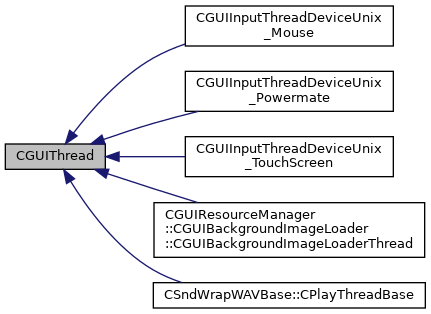This is the base class for Guiliani threads. More...
#include <GUIThread.h>

Public Member Functions | |
| void * | GetArg () const |
| ThreadPriority_t | GetPriority () |
| void * | GetThreadId () const |
| void | InitShutdown () |
| eC_Bool | IsRunning () const |
| eC_Bool | IsShutdownCompleted () const |
| void | SetArg (void *pArg) |
| void | SetPriority (const ThreadPriority_t &ePriority) |
| eC_Int | Start (void *pArg) |
| void | Terminate () |
| void | WaitForShutdown () |
Protected Member Functions | |
| CGUIThread (const eC_UInt &uiStackSize) | |
| virtual | ~CGUIThread () |
| virtual void | Cleanup () |
| virtual void | Execute (void *pArg)=0 |
| ThreadPriority_t | MapPriority (const eC_Int &iPriority) |
| eC_Int | MapPriority (const ThreadPriority_t &ePriority) |
| virtual void | Setup () |
Detailed Description
This is the base class for Guiliani threads.
Derive from this class if you want to create user threads and implement at least the Execute() method. Additionally, you may implement Setup() and Cleanup() to suit your needs.
- Notes for porting Guiliani
- The implementation of this base class in the Guiliani core only provides the platform-independent methods. When porting Guiliani to a new platform, the following methods of CGUIThread have to be implemented:
Thread class example:
Create and execute thread example:
Constructor & Destructor Documentation
◆ CGUIThread()
|
protected |
Protected contructor, because it should only be called by derived classes.
- Parameters
-
uiStackSize The stack size for the new thread in bytes
◆ ~CGUIThread()
|
protectedvirtual |
Virtual protected destructor, because it should only be called by derived classes.
Member Function Documentation
◆ Cleanup()
|
inlineprotectedvirtual |
Virtual method Cleanup is called after Execute and can be re-implemented in the user's derived class to clean up any allocated resources.
◆ Execute()
|
protectedpure virtual |
Virtual method Execute must be implemented in the user's derived class. It contains the thread's working code.
- Parameters
-
pArg Implementation-specific void pointer to the thread's working data
Implemented in CGUIResourceManager::CGUIBackgroundImageLoader::CGUIBackgroundImageLoaderThread, CGUIInputThreadDeviceUnix_TouchScreen, CGUIInputThreadDeviceUnix_Powermate, and CGUIInputThreadDeviceUnix_Mouse.
◆ GetArg()
|
inline |
GetArg method gets the arguments.
- Returns
- void pointer to Arguments.
◆ GetPriority()
| ThreadPriority_t CGUIThread::GetPriority | ( | ) |
Returns the priority.
- Returns
- thread priority.
◆ GetThreadId()
|
inline |
- Returns
- The ID of this thread.
◆ InitShutdown()
|
inline |
Sets the m_bRunning flag to false to initiate the shutdown process.
◆ IsRunning()
|
inline |
- Returns
- True if this thread is currently running, otherwise False.
◆ IsShutdownCompleted()
|
inline |
- Returns
- True if this thread has been completely shut down, otherwise False.
◆ MapPriority() [1/2]
|
protected |
Maps platform-specific priorities to Guiliani thread priorities.
- Parameters
-
iPriority thread priority value from platform specific priority.
- Returns
- mapped Guiliani priority.
◆ MapPriority() [2/2]
|
protected |
Maps Guiliani thread priorities to platform-specific priorities.
- Parameters
-
ePriority Guiliani thread priority.
- Returns
- mapped platform-specific priority.
◆ SetArg()
|
inline |
SetArg method sets the arguments.
- Parameters
-
pArg void pointer to arguments.
◆ SetPriority()
| void CGUIThread::SetPriority | ( | const ThreadPriority_t & | ePriority | ) |
Sets the new priority to the thread.
- Parameters
-
ePriority The new priority
◆ Setup()
|
inlineprotectedvirtual |
Virtual method Setup is called before Execute and can be re-implemented in the user's derived class.
◆ Start()
| eC_Int CGUIThread::Start | ( | void * | pArg | ) |
Creates and starts the thread. Platform-specific implementations should make sure to set this thread's ID (m_pThreadId).
- Parameters
-
pArg void pointer to the arguments.
- Returns
- Platform-specific return value, usually negative when an error occurred and 0 or larger when OK
◆ Terminate()
| void CGUIThread::Terminate | ( | ) |
Terminates the thread.
- Note
- This method may have platform-dependant side effects and should never be used in order to ensure a reliable platform-agnostic application. For example, destructors of objects created in the thread context will not be called when a thread is terminated.
On Windows (where TerminateThread() is called): Note that the MSDN documentation states "TerminateThread is a dangerous function that should only be used in the most extreme cases". The value 0xdeadbeef will be passed to TerminateThread() as dwExitCode.
On Linux (where pthread_cancel() is called): This will interfere with certain ways of exception handling since a abi::__forced_unwind exception will be thrown and must not be intercepted. If a catch-all is implemented in a user-derived thread class, this exception will need to be rethrown:
On other platforms this may be empty (as in the dummy thread) or execute arbitrary platform-specific code.
Again, when writing a Guiliani application this method should never be used. Guiliani will only use Terminate() in case a still running thread is destroyed, which will not happen during normal operation.
◆ WaitForShutdown()
| void CGUIThread::WaitForShutdown | ( | ) |
This method doesn't return until the thread has cleanly shut down.
The documentation for this class was generated from the following files:
- GUIThread.h
- GUIThreadDummy.cpp
